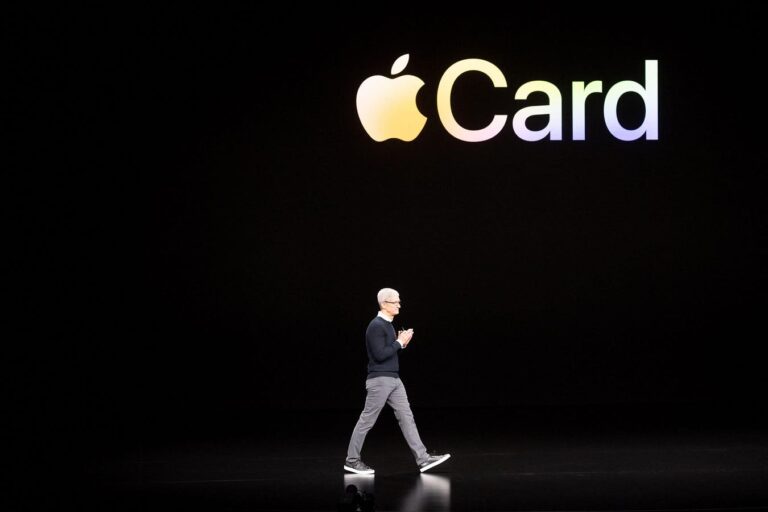Apple Is Trying to Unwind Its Goldman Sachs Credit Card Partnership
Apple has given Goldman Sachs a proposal to end its credit card and savings account partnership within the next 12 to 15 months. The move, if it were to happen, would effectively end one of the highest-profile partnerships between a bank and a tech company. It would also mean that Apple would need to find a new financial partner for its popular credit card, Apple Card, and its high-yield savings accounts under the Apple brand. While Apple offers both its credit card and savings account through the wallet app on iPhones, the banking back end is handled by Goldman Sachs. [CNBC]
Big back end changes could be coming to the Apple Card
More Signs of Belt-Tightening and a Slowing Economy
On the consumer front, fewer banks are raising standards for credit cards, auto and other consumer loans, though lending conditions remain historically tough. Consumers are relying more on credit cards for purchases. This is despite the higher interest rates seen on credit card balances. Credit card debt increased 4.7% during the period and 16.6% from a year ago, meaning Americans now owe $1.08 trillion on their credit cards. Look for delinquency rates on credit cards and auto loans to keep rising this year amid high card interest rates, high inflation and the slowing economy. Also, note how much the average APR for credit cards has risen since late 2021. Borrowers now see an average rate topping 20%, the highest since the mid-1990s. [Kiplinger]
Corporate America Has Dodged the Damage of High Rates. For Now
The biggest companies in the country have avoided the damage of higher interest rates. There are two key reasons that big business has avoided the hammer of higher rates. In the same way that the average rate on existing household mortgages is still only 3.6%, reflecting the millions of owners who bought or refinanced homes at the low-cost terms that prevailed until early last year, leaders in corporate America locked in cheap funding in the bond market before rates began to rise. Also, as the Fed pushed rates above 5 percent, from near zero at the start of 2022, chief financial officers at those businesses began to shuffle surplus cash into investments that generated a higher level of interest income. [The New York Times]
Discover Financial Services to Explore Sale of Student Loans Business
Discover’s board authorized management to explore the sale of its student loans business. The credit card company will explore the sale of its Discover Student Loans portfolio, according to a regulatory filing. It will also transfer the servicing of those loans to a third-party provider as it pursues strategic alternatives for the student loan business. Discover said it will stop accepting new applications for student loans on Feb. 1. It added there isn’t any impact to current customers with student loans or their payments at this time. [The Wall Street Journal]
The Holiday Spending Spree Is Fueled by ‘Buy Now, Pay Later’ Shoppers
The Black Friday and Cyber Monday billion-dollar US spending spree was fueled by “Buy Now, Pay Later” shoppers. On Cyber Monday, Buy Now, Pay Later purchases hit an all-time high, up 43% from a year ago, according to Adobe Analytics. The number of items per order also rose 11% annually as shoppers used Buy Now, Pay Later for larger purchases. While Cyber Monday and Black Friday hit online sales records, shoppers’ reliance on delayed payments could mean a financial squeeze when the bills come due. Consumers risk stacking on debt they can’t pay off with Buy Now, Pay Later purchases. [CNN]
Black Friday Sees Record Online Sales of Close to $10 Billion, with More than Half Coming from Mobile Purchases
Shoppers were pretty enthusiastic about hunting for deals online this Black Friday. Sales revenue from online shopping on Black Friday reached a record high of $9.8 billion, up 7.5% from last year, according to a report from Adobe. And more than half of that revenue, about $5.3 billion, came from mobile purchases. Influencers and social media advertising have helped fuel the growth of mobile transactions. [Business Insider]
Mastercard Doubles Down on Effort to Detect and Tackle Crypto Fraud with AI Tie-Up
Mastercard is doubling down on its efforts to detect and prevent fraud that’s routed through cryptocurrency exchanges. The company told CNBC exclusively that it’s partnered with Feedzai, a regulatory technology platform that aims to combat money laundering and financial scams online using artificial intelligence. Through the partnership, Feedzai will integrate directly with Mastercard’s CipherTrace Armada platform, which is used to help banks monitor transactions from over 6,000 crypto exchanges for fraud, money laundering and other suspicious activity. [CNBC]
Congress Considering Credit Card Bill that Would Throw Holiday Plans into Reverse
As we approach the holiday season, now is not the time to pull the rug out from everyday Americans. But some members of Congress are supporting a bill that would defund the programs that make credit card rewards possible and strip away the funding that provides a hassle-free, secure payment experience for both you and the stores you visit. They say they want competition even though a similar effort with debit cards ended up costing consumers more money, not less. The only group that benefitted were big corporate megastores which pocketed the money at the expense of rewards programs and card security. [The Hill]
Cristiano Ronaldo Faces $1 Billion Lawsuit over Binance Ads
Footballer Cristiano Ronaldo is facing a class action lawsuit in the US over his promotion of Binance, the largest cryptocurrency exchange in the world. The plaintiffs claim his endorsement led them to make loss-making investments. They are seeking damages of “a sum exceeding” $1billion. [BBC]


